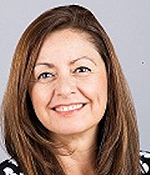 In Spring 2021, Cognitive & Information Sciences welcomed a new Professor: Dr. Zenaida Aguirre-Muñoz. We asked Zenaida about her background, research and teaching interests, and why she’s excited about UC Merced. See her responses below.
In Spring 2021, Cognitive & Information Sciences welcomed a new Professor: Dr. Zenaida Aguirre-Muñoz. We asked Zenaida about her background, research and teaching interests, and why she’s excited about UC Merced. See her responses below.
What is your background?
I was born in Guadalajara, Mexico, and raised in San Diego, California, in a large family. My mother, a very proud Latina, maintained our heritage language by only allowing Spanish in the house. I took pride in my bilingualism and double majored at UC Santa Barbara in Psychology and Spanish. I used what I was learning in these areas as an instructional aide in a local bilingual elementary school. As a former emergent bilingual, my commitment and joy in working with emergent bilinguals led me to UCLA where I studied alternative content assessment methods for emergent bilinguals and completed a doctorate in Psychological Studies in Education. After grad school I was a Senior Researcher at a research center at UCLA for a few years then joined the faculty at Texas Tech University where I raised my three sons, Joaquin, Cruz, and Juan Amado. In 2017, I joined the faculty at the University of Houston in the Psychological, Health, and Learning Science department.
What are your research/scholarship interests?
I am interested in developing ways to maximize learning opportunities for underserved student populations in P-16 contexts. I use theories and methods from cognitive science, language development, learning sciences, and assessment to answer questions pertaining to: (a) STEM education; (b) STEM teacher development; (c) model-based assessment and instruction of dual language learners; (d) the impact of opportunity to learn on learning and achievement; and (e) content-area literacy development for emergent bilinguals. Some of my current research projects include examining how young emergent bilinguals communicate in inquiry tasks in science and engineering; the integration of technology to promote disciplinary discourse; and how motivational factors mediate the learning of and persistence in STEM.
What are you excited to teach?
I am very excited about teaching courses in language and linguistics because the role of language in learning is so fundamental, particularly in linguistically diverse classrooms. I am also interested in teaching course that examines cognition and learning in STEM context and how to address opportunity gaps to increase equity in minoritized communities.
What drew you to CIS at UC Merced?
The interdisciplinary faculty and students who work so well together and the genuine commitment to elevating each other’s work. I am very excited to be joining such an impressive community.



